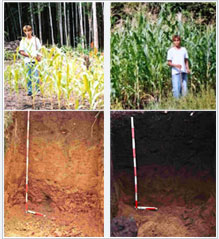Biochar is a charcoal-like substance produced by heating biomass in the absence of oxygen. Biochar is distinguished from charcoal in that it is intended not for use as fuel but for use as a soil amendment, where its high surface area and active carbon surface can create durable soil fertility improvements. Biochar is typically over 70% carbon, and this carbon in properly produced biochar is stable for hundreds to thousands of years in the soil. Deposits of biochar have been found in high-temperature, high-rainfall Amazonian soils dating back over 5000 years, providing direct evidence of long-term stability.
Biochar in soils has been demonstrated to retain water and nutrients, encourage beneficial soil microorganisms, and enhance soil fertility while reducing inputs of conventional fertilizers.These improvements have been shown to be persistent.
Biochar can be produced from agricultural and forest wastes sustainably, worldwide. Large-scale deployment of biochar in agriculture can deliver gigatons of annual carbon sequestration while improving farm productivity, making us all healthier and wealthier.
Portfolio Companies:

Watch The Promise of Biochar

Soil Carbon, Science, Policy and Politics
Watch VenEarth Managing Partner John Moussouris January, 09 presentation on Biochar, Agriculture and Climate.

Small crop size associated with naturally occurring exisol
Robust crop size and yield associated with Terra Preta







No comments:
Post a Comment